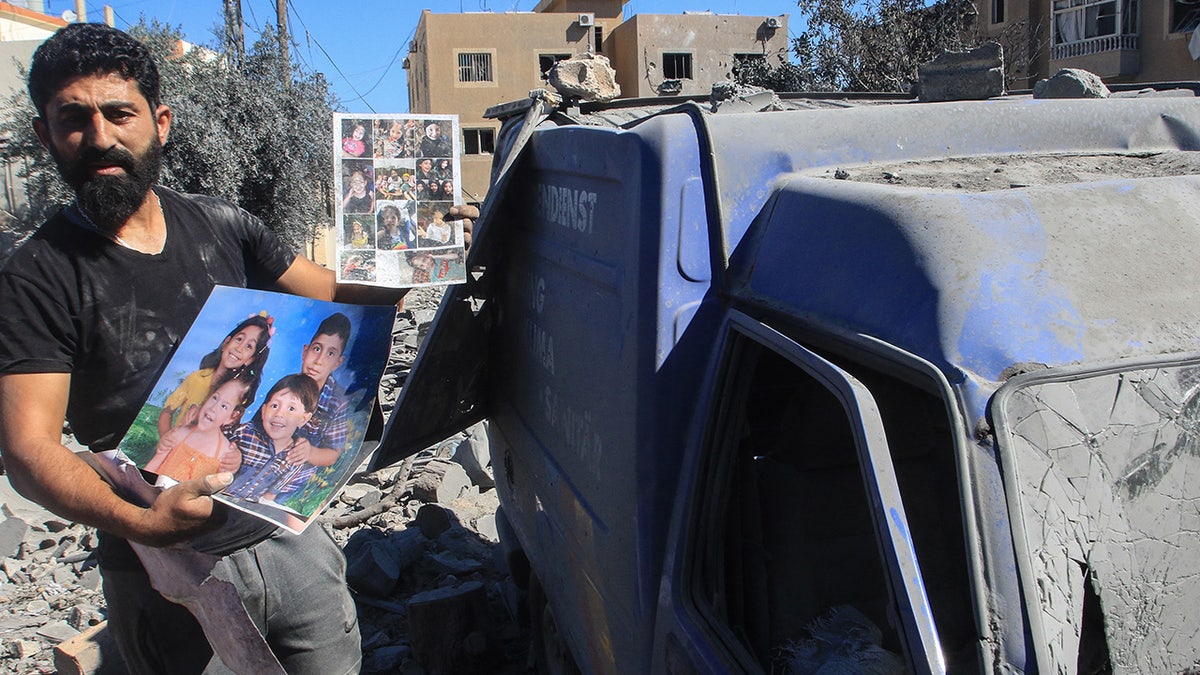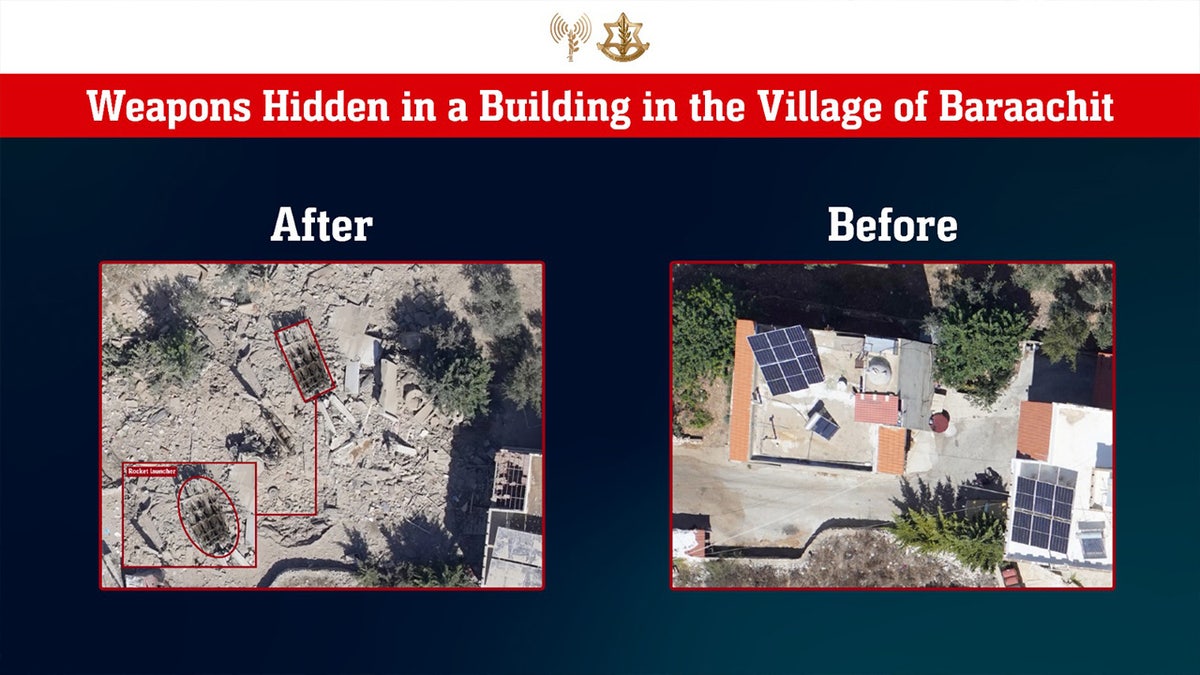
The fighting between Israel and Hezbollah has drastically escalated over the last month as the Israel Defense Forces (IDF) has begun targeting the terrorist network’s hot spots and military storage units, all of which are strategically embedded within civilian villages.
Images and videos provided to Fox News Digital of the recent strikes in southern Lebanon show precision missiles hitting what have been deemed civilian buildings.
Hezbollah’s use of civilian infrastructure has not only created a sophisticated network of meeting houses, weapons storage units and well-hidden missile launching positions across southern Lebanon and in the suburbs of Beirut, it has ensured a war with Hezbollah cannot be conducted without immense collateral damage.
ISRAEL READIES RESERVE TROOPS ON BORDER WITH LEBANON: ‘PREPARE YOURSELVES’
Hezbollah rockets are stored in a building somewhere in Lebanon. (IDF Spokesman’s Unit. )
Since Monday, more than 1,800 casualties have been reported and at least 560 people are believed to have been killed, including 50 children and more than 90 women, according to the Lebanese Health Ministry.
On Thursday, the U.S. again urged Israel to agree to a cease-fire in Lebanon, and deputy Pentagon press secretary Sabrina Singh confirmed with reporters that the U.S. is not aiding Jerusalem militarily or with intelligence in its Lebanon-based campaign.
Israeli Prime Minister Benjamin Netanyahu has rejected the international community’s calls for a cease-fire and instead instructed his troops to continue fighting “with full force.”
French President Emmanuel Macron on Wednesday warned Israel that it “cannot without consequence just expand its operations to Lebanon” as commanders on the Israeli-Lebanon border ordered its troops to “prepare” for a possible ground invasion.
No invasion has been ordered at this time, though Israeli and U.S. security experts have told Fox News Digital that the network Hezbollah has established on the foundation of everyday life within Lebanon means war with the terrorist network will likely be even more costly in terms of human lives than what has been witnessed in Gaza.

Smoke rises from Israeli airstrikes on villages in the Nabatiyeh district, seen from the southern town of Marjayoun, Lebanon, on Monday, Sept. 23, 2024. (AP Photo/Hussein Malla)
According to the Israel-based Alma Research and Education Center, a nonprofit organization that researches Israeli security challenges along the border with Lebanon, Hezbollah has long relied on the use of civilian infrastructure to serve its needs.
“The phenomenon of renting houses, rooms, warehouses within the Shiite civilian areas by Hezbollah is well known since the beginning of the 2000s,” Tal Beeri, head of the research department at Alma, told Fox News Digital, adding that the terrorists also rent structures in non-Shia areas of Lebanon as well.
“Evidence of this matter was found in looted documents and investigations of Hezbollah operatives during the Second Lebanon War in 2006. Since then, Hezbollah has only accelerated the phenomenon and estimates are that every third house in southern Lebanon has been used by Hezbollah for its needs,” he added.
Beeri shared research with Fox News Digital that showed findings from 2021 breaking down the sophisticated system in which Hezbollah has intertwined itself in the everyday running of local villages across the country.

A man displays photographs as people sift through the rubble of a building in an area targeted overnight by Israeli airstrikes in Lebanon’s town of Saksakiyeh, on Sept. 26, 2024. Israel flatly rejected on Sept. 26 a push led by key backer the United States for a 21-day cease-fire in Lebanon, as it vowed to keep fighting Hezbollah militants “until victory.” (Photo by MAHMOUD ZAYYAT/AFP via Getty Images)
Hezbollah officials dubbed a “Rabat” – loosely translated to “the liaison” – are installed in villages across Lebanon and serve as the representative of the terrorist group, facilitating the needs of the villagers in coordination with the hyper-localized operations of Hezbollah.
The Rabat, which can oversee multiple villages, reportedly establishes relationships with the residents by facilitating requests for aid such as money, food and even with localized disputes.
“In places where Hezbollah decides to expropriate or lease civilian land or properties from the residents for the purpose of its military activities, the ‘Rabat’ conducts the expropriation or leasing procedure vis-à-vis the relevant resident,” Beeri found.
The report, based on documents seized following the 2006 war with Hezbollah, found that the Rabat also recommended to local Hezbollah units the best locations in each town that are “suitable to serve the human shield tactic” based on the storage requirements surrounding concealment, infrastructure type and weapons placement.

Images show civilian buildings used by Hezbollah in Lebanon to store weapons. (Photo provided by Israel Defense Force)
The Rabat then coordinates the logistics between the terrorist organization and the local property owner.
“The ‘Rabat’ strengthens Hezbollah’s grip on the Lebanese village residents’ day-to-day life, their property, and needs, allowing Hezbollah to turn them into human shields on a wider scale,” the report found.
Hezbollah’s control over local communities and its ability to stockpile and transfer weapons throughout the country through a sophisticated tunnel system signifies that the UN Resolution 1701 passed in 2006 to prevent a third war between the terrorist network and Israel has failed.
CLICK HERE TO GET THE FOX NEWS APP
While it remains unclear if U.N. Security Council members are looking to revamp the resolution to counter the terrorist group’s movements and stop Israeli operations in civilian areas, the international community has called on Netanyahu to cease his campaign – many leaders from both adversary and allied nations, have fervently warned against invading Lebanon.
Netanyahu is set to address the U.N. body on Friday during what has been described by the Israeli ambassador to the U.N. as the most “hostile” environment he has seen in his roughly 10 years of attending the top summit.




















